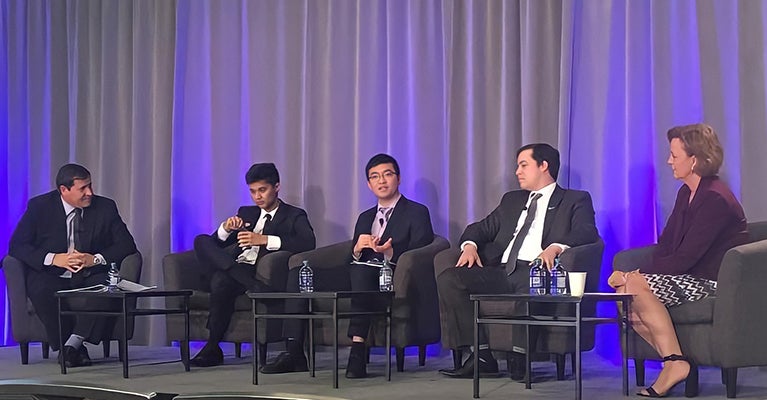The Mighty Mentor: Making A Meaningful Impact on the CPA Profession
David Lao, CPA, is based in Ottawa and is a Senior Financial Analyst with the Government of Canada. He received a Bachelor of Accounting at the Goodman School of Business at Brock University. David received both the 2017 CFE National Honour Roll and CPA Ontario Kenneth Victor Chernick Award for his achievement on the Common Final Examination (CFE). He’s also a member of CPA Ontario’s Emerging Leaders Committee and has been volunteering with other CPA Ontario initiatives since 2018.
David is also an exceptionally committed practical experience mentor with a current roster of 45 CPA students. We asked him about his mentorship process and how other CPAs and students can get the most out of the experience.

What has been your CPA journey? Why did you become a CPA?
My journey as a CPA has been a mix of experiences in both the public and private sectors. I started my career in public accounting, where I gained a solid foundation in auditing and assurance services. After a few years in public accounting, I transitioned to the public sector, where I’ve worked as a senior financial analyst the Government of Canada. In this role, I gained valuable experience in financial reporting, budgeting and analysis.
I decided to become a CPA because of the brand recognition and prestige associated with the designation. The CPA designation is well-respected in the business world and having those three letters after your name can open doors to a variety of career opportunities. CPAs are in demand in both the public and private sectors and can work in a variety of industries and fields. From accounting and finance to consulting and entrepreneurship, the skills and knowledge gained as a CPA can be applied to a wide range of careers.
Why did you become a mentor to CPA students?
I see mentorship as a way of making a meaningful impact on the profession and helping to shape the future of the accounting industry. I was initially drawn to CPA Ontario’s mentorship program because of its focus on mentorship as a means of building strong and supportive professional relationships.
After completing the necessary training and professional development provided by CPA Ontario, I was matched with my first mentee and quickly found the experience to be rewarding and fulfilling.
Most CPAs mentor two to three students at one time, but you currently mentor 45! How do you develop and maintain strong relationships with your mentees?
I believe that open communication and accessibility are crucial for maintaining strong relationships with each student. I make myself available through various channels such as email, phone and video conferencing to ensure that my mentees can easily reach out to me when they need guidance or support.
To manage the larger number of mentees, I rely on technology to stay organized and track my interactions with each CPA student. I actively listen and strive to understand their unique needs and goals, so that I can tailor my guidance to their specific circumstances.
In addition, I believe that setting clear expectations and regularly following up with my mentees helps to foster accountability and build trust. I am committed to providing the necessary support and guidance to help my mentees succeed in their professional journeys.
What factors make a good mentor for CPA students? Why should other CPAs get involved?
I think industry expertise, effective communication skills and a commitment to on-going learning are key qualities that make a good mentor. Industry expertise allows mentors to guide their mentees in their professional development, while effective communication skills help them build strong relationships and provide tailored guidance. Commitment to ongoing learning is important to stay current with industry trends and best practices and to better equip mentors to guide their mentees towards success.
For the mentor, it's an opportunity to give back to the profession, share their expertise and develop their own mentoring skills. Ultimately, mentorship is a win-win for everyone involved, and I encourage other CPAs to get involved in this important work.
What advice or resources have helped you to be a better mentor?
As a mentor, I’ve discovered a range of resources that have been instrumental in improving my effectiveness in this role. I’ve found that training and professional development programs offered by CPA Ontario have been particularly helpful. By attending workshops and seminars on effective mentoring, I have been able to gain a better understanding of what it takes to be a successful mentor, as well as acquire practical tools and techniques that have helped me guide my mentees.
I have also realized that continuing to develop my skills is essential to my effectiveness as a mentor. This includes actively listening to my mentees, being patient and flexible in addressing their unique needs and seeking advice and guidance from experienced mentors. By following these strategies, I am better able to support and guide my mentees as they work towards achieving their goals.
What is your advice to CPA students on how to get the most out of the mentorship process?
First, set clear goals. It's important to have a clear idea of what you want to achieve from the mentorship, whether it's improving your technical skills, expanding your network or getting advice on career development. This will help guide your interactions with your mentor and ensure that you're getting the most value out of the experience.
Also, be proactive. Don't wait for your mentor to reach out to you - take the initiative to schedule meetings, ask questions and seek feedback. Remember that your mentor is there to support you, but it's ultimately up to you to drive the relationship and make the most of the experience.
Finally, it's important to approach the mentorship process with an open mind and a willingness to learn. Be receptive to feedback and advice from your mentor, and don't be afraid to step outside of your comfort zone and try new things. The mentorship process is a valuable opportunity to learn and grow, and by being proactive and open-minded, you can maximize the benefits for your personal and professional development.
What have your mentees taught you throughout the process?
My mentees have taught me a lot about new perspectives, patience, technology and innovation. They come from diverse backgrounds and have unique experiences that offer fresh perspectives on accounting and business practices.
Mentoring requires patience and adaptability to different learning styles and personalities, which my mentees have helped me develop. They also tend to be more tech-savvy and have introduced me to new tools and platforms that can improve workflow and productivity. The mentoring relationship is a two-way street, with both parties learning and growing from each other.
Rapid fire
- Favourite book or podcast: Balados en français, Radio-Canada
- A current hobby: Watch Netflix
- Name something on your bucket list: Learn to snowboard


